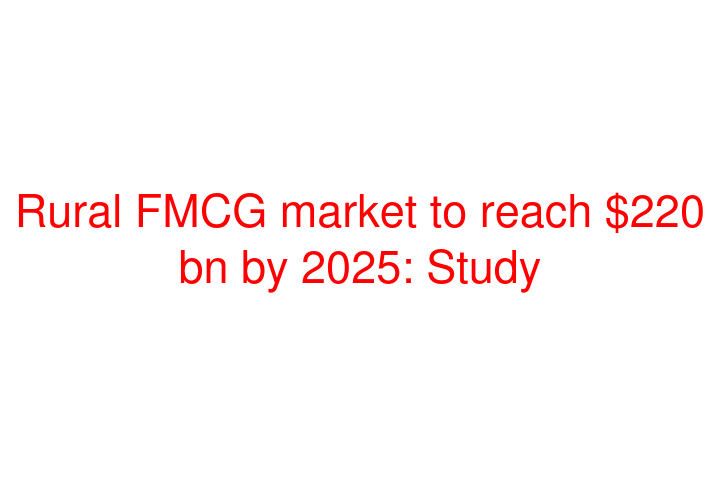 New Delhi, Nov 15 (IANS) India's rural fast moving consumer goods (FMCG) market is expected to grow at a compounded annual growth rate of 14.6 per cent and reach $220 billion by 2025, a joint study said here on Wednesday.
New Delhi, Nov 15 (IANS) India's rural fast moving consumer goods (FMCG) market is expected to grow at a compounded annual growth rate of 14.6 per cent and reach $220 billion by 2025, a joint study said here on Wednesday.
This is because of rural population using e-commerce and digital connectivity services due to high penetration of smartphones, credit and debit cards, and online banking.
In the light of this, making their products available to customers sitting in far and wide corners of the country waiting to be serviced was the next big challenge before large FMCG companies, the study said.
According to the study, jointly published by MRRSIndia.com and Assocham, India's FMCG market is expected to reach $103.7 billion by 2020 from the current level of $49 billion, while the retail market is likely to reach $1.1 trillion from the current $680 billion.
"Retail and FMCG markets in India are exponentially growing and are expected to grow at 20 per cent and 21 per cent respectively per annum."
Releasing the study, an Assocham spokesperson said though the attention was on the affluent and elite households in the country, but the major focus has been in metros, state capitals and larger towns.
"There is a strong and growing market in the next tier of towns with population of less than one million, these towns number more than 600 spread in the width and breath of India," the study said
"It is estimated that these 600 towns will add another 30 per cent of elite or affluent households and is a sitting market set to be grabbed."
The study observed that Indian consumers have adapted to new technologies and thus fundamentally modified the structure of demand.
"This demand is shaped by factors such as, noticeable shift in demographics with rising income middle class, rise in number of smaller towns entering consumption bandwagon, emergence of new channels like e-commerce, proliferation of the internet connectivity, demand driven by digital media."
The study highlighted that decoding these consumption patterns would be critical for companies to re-imagine themselves and build new capabilities to win in this new world.
Health and wellness was a mega trend shaping consumer preferences and shopping habits, which leading global and Indian food and beverage brands have embraced and were focused on creating new markets demands, it said.
Further, the study said after the implementation of GST, retailers are expecting the FMCG companies to cut down on the prices of their products and believe if the companies don't revise their prices, they will lose around two to three per cent margins.
In order to achieve better market growth, the retailers and the FMCG companies will have to work in synergy, it noted.
Assocham said the large FMCG companies have focused primarily and made significant improvements to manufacturing, service and maintenance operations through lean techniques.
"However, there is not much focus on similar stringent strategies for warehouse operations and transportations. The need of the hour to enhance availability and improve cost efficiencies is in the logistics and transportation sector," it added.
(This story has not been edited by Social News XYZ staff and is auto-generated from a syndicated feed.)
About VDC
Doraiah Chowdary Vundavally is a Software engineer at VTech . He is the news editor of SocialNews.XYZ and Freelance writer-contributes Telugu and English Columns on Films, Politics, and Gossips. He is the primary contributor for South Cinema Section of SocialNews.XYZ. His mission is to help to develop SocialNews.XYZ into a News website that has no bias or judgement towards any.
